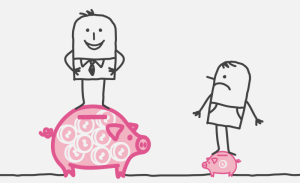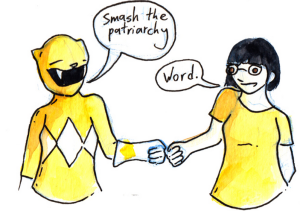
A person appears sad and thoughtful, their head resting in their hand.
The hardest breakups I’ve gone through have been the ones I’ve had to initiate myself.
Like most women, I’ve been socialized not to trust my own gut feelings, and the days or weeks (or, in a few sad cases, months) leading up to those breakups were full of second-guessing and invalidating myself.
Did I really have to leave such a nice person? Were things really that bad?
As embarrassing as it is to admit how long it sometimes took me to do what needed to be done, I’m not exactly surprised – my brain couldn’t stop debating itself long enough to say the words.
Most resources for dealing with breakups are aimed at the person who’s getting dumped. That makes sense – having someone break up with you is often really painful, and it’s often a more sharp and surprising sort of pain than what I’m going to talk about here.
But being the one who realizes a relationship needs to end and takes action to end it can also be really hard.
My intention isn’t to compare these two experiences – most of us have gone through both and might have very different perspectives on which is relatively easier or harder. Point is, they both suck.
Since there’s less out there on doing the actual breaking up, I want to use this space to affirm those of you who are struggling with it.
Breaking up is hard to do – but these affirmations can help.
1. You Don’t Owe Romantic or Sexual Interest to Anyone
Many people, especially women, are socialized to feel like the mere fact that someone likes them means they have to try to like them back. If someone likes us, we see it as a favor – and it’s only polite to return favors.
This can cause a lot of us to end up in relationships we never really wanted to be in. It can also make it really difficult to end relationships that we no longer want to be in.
Just because you’re a feminist, that doesn’t mean you’re completely finished unlearning the many ways in which you’ve been taught to prioritize others before yourself – I know I’m not.
If you’re having a hard time ending a relationship you know you don’t want anymore, it might be because some part of you still feels like owe your partner that relationship.
In those moments, it can be helpful to remind yourself that you don’t owe any sort of intimacy to anyone, ever, no matter how much they want it.
2. It’s Okay to Stop Trying to ‘Work’ on the Relationship
Something I often hear from friends who have recently been dumped is: “But why didn’t they tell me they weren’t happy in our relationship? We could’ve worked on it!”
Of course, that’s a totally valid way to feel – and I’d expand on that more if this were an article for people who just got broken up with, rather than the people who are doing the breaking up.
The problem is that that sentiment is part of a broader cultural message – again, targeted mainly at women and people perceived as women – that makes folks feel obligated to “work” on relationships they no longer want to be in.
If you do want to try to fix things before going for the nuclear option, that’s obviously okay. Sometimes unhealthy or unhappy relationships can improve with effort, and that effort can be totally worth it.
But the effort has to be coming from both partners. If the relationship isn’t working well for you and you’re the only one putting in any effort to fix it, that’s not fair to you.
In fact, it’s okay not to work on the relationship at all. You’re allowed to just be done.
Maybe you don’t think working on it would do any good, or maybe you’re just tired of the emotional labor. Maybe your feelings for your partner have become so negative that you honestly just never want to see them again, much less work on anything together.
That’s okay. You don’t owe them any kind of work.
3. You Can’t Always Avoid Hurting People – And That’s Okay
One of the reasons breaking up with a partner is so hard is that even if you don’t want to be in a relationship with them anymore, you probably still care about them.
It’s never easy to hurt someone you care about. Hell, many of us have a hard time hurting people we no longer care about at all.
But your own boundaries and wellbeing cannot be the price of sheltering someone else from pain.
It’s good to try to tread lightly in other people’s lives and avoid hurting them when you can, but sometimes you can’t. A breakup is one such time.
Sometimes we try to compromise with ourselves by “letting them down easy,” or offering to “still be friends” when we know we don’t want to.
Not only does that sort of dishonesty ultimately cause the person even more pain, but it’s also not fair to you. Just as you shouldn’t have to date someone you don’t want to date, you shouldn’t have to be friends with someone you don’t want to be friends with.
4. Your Partner Doesn’t Have to Agree That It’s Time for Things to End
One of the scariest things I ever hear from others is this: “I really want to break up with my partner, but they don’t want to, so we’re staying together.”
The fact that it’s almost always women, feminine people, or people assigned female at birth who are saying this about their male partners doesn’t escape me – part of male privilege is that it makes it that much more likely for a man’s opinions and preferences to automatically take precedence over others’.
When you’re still in a relationship, doing things by consensus and compromise can be very healthy.
But that doesn’t mean that you also have to agree about when it is time for the relationship to end. It’s often easier when both partners are ready for things to be over, but that doesn’t mean you have to debate the issue until you reach that point.
Think about it – if we always had to come to a compromise on where the lines of intimacy should be drawn, tons of people would end up having their boundaries violated.
That’s why the person who wants the least intimacy gets their way, every time. If I want to break up and you don’t, we break up. That doesn’t mean you can’t have your feelings about the breakup, but it’s the only way to avoid pressuring someone into something.
If you feel like you can’t leave a relationship, that’s a big red flag for abuse. In non-abusive relationships, leaving is always an option, even if it hurts. In abusive relationships, one partner makes the other feel like ending the relationship will destroy one or both partners’ lives, or even lead to violence.
That’s not healthy, and it’s okay to ask for help.
5. You Will Be Okay Without This Relationship – Even If It Takes Time
During times when I was more depressed and had more issues with self-worth, I had a really hard time ending relationships – even if I had absolutely no feelings for that person anymore.
The reason was that I felt strongly that I couldn’t be alone, and that I’d never find anyone else who’d want to be in a relationship with me.
I turned out to be wrong about both of those things. I could be alone, and I spent plenty of time that way. I also found new partners, especially as I worked on my own mental health.
If you’re feeling like you can’t break up with your partner because you can’t handle what comes next, you’re not alone.
It’s true that you don’t know exactly how things will be after the breakup, and nobody could possibly know. It would be cool if we all had crystal balls that told us exactly when we’d find our next relationships, but that’s not how it works.
But you will be okay. Even if you need a lot of support from friends, family, or even a therapist.
And by the way, a breakup is a totally valid reason to get some therapy, even if you don’t have A Diagnosable Mental Health Issue. Wanting therapy is enough of a reason to get therapy.
So is feeling like you’re not going to be okay.
Most importantly, staying in an unhappy relationship won’t heal your fears about being alone or finding someone who likes you for you. In fact, it might only make them worse. You owe yourself a chance to start fresh.
If you’re having trouble dealing with a breakup, regardless of which side of it you’re on, these excellent resources can help.
When you finally end a relationship you’ve desperately wanted to get out of, you might feel relieved, overwhelmed, joyful, sad, or some combination of all of those. It doesn’t always feel good right away, but it creates space in your life so that you can finally move forward.
Take good care of yourself as you do.
[do_widget id=’text-101′]
Miri Mogilevsky is a Contributing Writer for Everyday Feminism and a recently graduated with a Masters in Social Work and is starting a career as a counselor in Columbus, Ohio. She loves reading, writing, and learning about psychology, social justice, and sexuality, and is working on her cat photography skills. Miri writes a blog called Brute Reason, rants on Tumblr, and occasionally even tweets @sondosia.
Search our 3000+ articles!
Read our articles about:
Our online racial justice training
Used by hundreds of universities, non-profits, and businesses.
Click to learn more




















